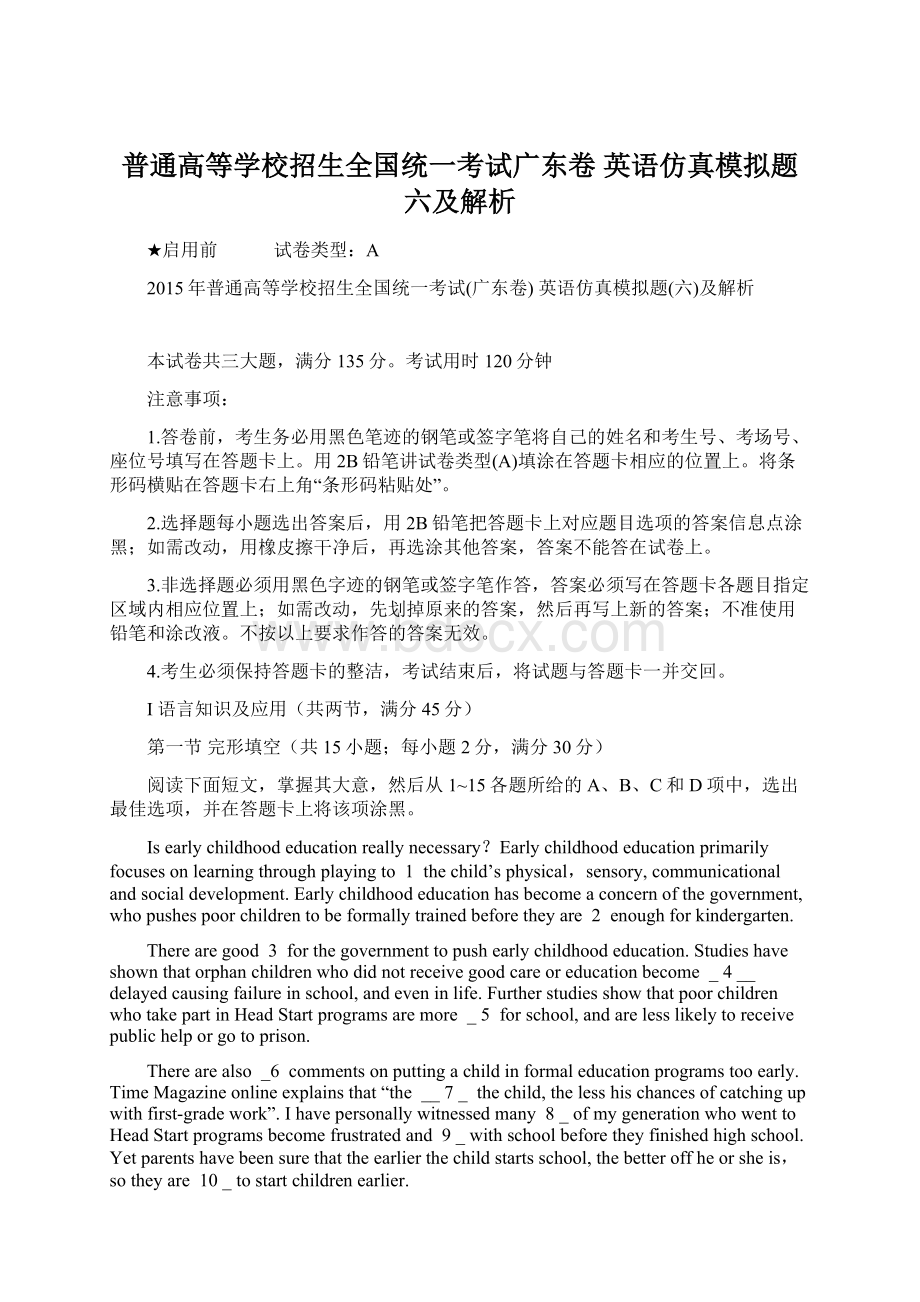普通高等学校招生全国统一考试广东卷 英语仿真模拟题六及解析.docx
《普通高等学校招生全国统一考试广东卷 英语仿真模拟题六及解析.docx》由会员分享,可在线阅读,更多相关《普通高等学校招生全国统一考试广东卷 英语仿真模拟题六及解析.docx(15页珍藏版)》请在冰豆网上搜索。

普通高等学校招生全国统一考试广东卷英语仿真模拟题六及解析
★启用前试卷类型:
A
2015年普通高等学校招生全国统一考试(广东卷)英语仿真模拟题(六)及解析
本试卷共三大题,满分135分。
考试用时120分钟
注意事项:
1.答卷前,考生务必用黑色笔迹的钢笔或签字笔将自己的姓名和考生号、考场号、座位号填写在答题卡上。
用2B铅笔讲试卷类型(A)填涂在答题卡相应的位置上。
将条形码横贴在答题卡右上角“条形码粘贴处”。
2.选择题每小题选出答案后,用2B铅笔把答题卡上对应题目选项的答案信息点涂黑;如需改动,用橡皮擦干净后,再选涂其他答案,答案不能答在试卷上。
3.非选择题必须用黑色字迹的钢笔或签字笔作答,答案必须写在答题卡各题目指定区域内相应位置上;如需改动,先划掉原来的答案,然后再写上新的答案;不准使用铅笔和涂改液。
不按以上要求作答的答案无效。
4.考生必须保持答题卡的整洁,考试结束后,将试题与答题卡一并交回。
I语言知识及应用(共两节,满分45分)
第一节完形填空(共15小题;每小题2分,满分30分)
阅读下面短文,掌握其大意,然后从1~15各题所给的A、B、C和D项中,选出最佳选项,并在答题卡上将该项涂黑。
Isearlychildhoodeducationreallynecessary?
Earlychildhoodeducationprimarilyfocusesonlearningthroughplayingto1thechild’sphysical,sensory,communicationalandsocialdevelopment.Earlychildhoodeducationhasbecomeaconcernofthegovernment,whopushespoorchildrentobeformallytrainedbeforetheyare2enoughforkindergarten.
Therearegood3forthegovernmenttopushearlychildhoodeducation.Studieshaveshownthatorphanchildrenwhodidnotreceivegoodcareoreducationbecome_4__delayedcausingfailureinschool,andeveninlife.FurtherstudiesshowthatpoorchildrenwhotakepartinHeadStartprogramsaremore_5forschool,andarelesslikelytoreceivepublichelporgotoprison.
Therearealso_6commentsonputtingachildinformaleducationprogramstooearly.TimeMagazineonlineexplainsthat“the__7_thechild,thelesshischancesofcatchingupwithfirst-gradework”.Ihavepersonallywitnessedmany8_ofmygenerationwhowenttoHeadStartprogramsbecomefrustratedand9_withschoolbeforetheyfinishedhighschool.Yetparentshavebeensurethattheearlierthechildstartsschool,thebetteroffheorsheis,sotheyare10_tostartchildrenearlier.
Actuallywhileearlyformaleducationofpoorchildrendoesshowgreat11_intheearlyelementaryyears,studiesalsoshowthatthisheadstartisreallya“12___start”,asthegainsarelostinmiddleandhighschoolyears.Itseemsthatenvironmentisabiggerfactoronlife’ssuccessthanearly13_.HeadStartprogramshavenotachieveditsoriginalgoalin___14___theachievementgapinpoorandrichmiddleschoolchildren.Perhapsitistimetofindother15_toclosethatgap.
1.A.decreaseB.promoteC.preventD.delay
2.A.oldB.strongC.tallD.good
3.A.waysB.choicesC.reasonsD.chances
4.A.spiritualB.mentallyC.physicallyD.developmentally
5.A.solvedB.preparedC.occupiedD.taught
6.A.positiveB.enjoyableC.negativeD.fantastic
7.A.clevererB.biggerC.olderD.younger
8.A.friendsB.childrenC.parentsD.adults
9.A.boredB.excitedC.inspiredD.interested
10.A.surprisedB.specialC.eagerD.easy
11.A.failureB.mistakesC.lossesD.gains
12.A.wiseB.falseC.lateD.careful
13.A.schoolB.childrenC.educationD.work
14.A.improvingB.teachingC.makingD.closing
15.A.waysB.childrenC.problemsD.goals
第二节语法填空(共10小题,每小题1.5分,满分15分)
阅读下面短文,按照句子结构的语法性和上下文连贯的要求,在空格处填入一个适当的词或使用口号中词语的正确形式填空,并将答案填写在答题卡标号为16~25的相应位置上。
Onedayanarcher(弓箭手)drewabigcrowdwhilepractisingshooting.Hewasveryskillful.Heshotsoaccurately____16____theon-lookerscheeredwith____17____(excite).Hebecameveryproudofhisskill.Butamongthecrowd____18____oldoilselleronlynoddedhisheadindifferently.
Hewentovertotheoldmanandquestionedhim____19____hecoulddothat.Theoldmanshookhishead.Thenthearcherasked,“Whatdoyouthinkof___20___skill?
”
“Justokay,butnothingspecial.You’vegainedyouraccuracyfromconstantpractice.That’sall.”Theoldoilsellerreplied.
“Whatcanyoudo,then?
”Thearcherasked.
Theoldmansaid____21____.Hejustputabottleonthegroundandcovereditsmouthwithacointhathadalittleholeinthemiddle.____22____(hold)hisoiljarhigh,hebegantofillthebottle.Athreadofoilcamedownfromthejar____23_____thebottlejustthroughtheholeofthecoin.Everybodyaroundwatchedwiththeireyeswide.However,theoldmansaid,“Thisisnothingspecial.IcandothisbecauseI____24____(practise)forlong.”And____25____thesewords,heleft.
II.阅读(共两节,满分50分)
第一节阅读理解(共20小题;每小题2分,满分40分)
阅读下列短文,从每题所给的A、B、C和D项中,选出最佳选项,并在答题卡上将该项涂黑。
A
Practiceafterpractice,askinnyyoungboywholovedfootballwithallhishearteagerlygaveeverythinghehad.Butbeinghalfthesizeoftheotherboys,hegotabsolutelynowhere.Atallthegames,hesatonthebenchandhardlyeverplayed.Buthisfathercontinuedtoencouragehim.Allthroughhighschoolhenevermissedapracticenoragamebutremainedabench-warmerallfouryears.Hisfatherwasalwaysinthestands,alwayswithwordsofencouragementforhim.Goingtocollege,hedecidedtotryoutforthefootballteamasa“walk-on.( 临时队员)”Everyonewassurehecouldnevermakeit,buthedid.Henevermissedpracticeduringhisfouryearsatcollege,buthenevergottoplayinagame.
Attheendofhisseniorfootballseason,thecoachmethimwithatelegram,tellinghimhisfatherdiedthatmorningandallowinghimtotakethewholeweekoff.Besides,thecoachevenaskedhimnottoplantocomebacktothegameonSaturday.OnthatSaturday thegamewasnotgoingwell. Theteamwastenpointsbehindinthethirdquarterwhentheyoungmanranontothesidelines,andthecoachandhisplayerswereastoundedtoseetheirfaithfulteammatebacksosoon. Thoughrefusedagainandagainbythecoach,hewasfinallyallowedtogoinforhispersistence.Beforelongthislittleunknown,whohadneverplayedbeforewasdoingeverythingright.Soon,histeambegantotriumph. Finally,thecoachasked,“Youwerefantastic!
Tellmehowyoudidit?
”
Hesaidtearfully,“Youknewmydaddied,butdidyouknowthatmydadwasblind?
”Heforcedasmile,“Dadcametoallmygames,buttodaywasthefirsttimehecouldseemeplay,andIwantedtoshowhimIcoulddoit!
”
Liketheathlete’sfather,Godisalwaystherecheeringforus.He’salwaysremindingustogoon.He’sevenofferingusHishandforHeknowswhatisbest,andiswillingtogiveuswhatweneedandnotsimplywhatwewant.
26.Theunderlinedsentenceinpara.1impliesthat__________.
A.hehadnoideawhereheshouldgo
B.hedidn’thavethechancetoplay
C.hedidn’thaveaplacetopractise
D.hehadneverwonagameactually
27.TheboywasrefusedwhenattendingtheSaturdaygamebecause__________.
A.neitherthecoachnortheaudiencelikedhim
B.hesufferedfromsadnessforhisfather’sdeath
C.hehadnoteverplayedinagamebefore
D.heshouldtakearestforhisfather’sdeath
28.Whatcanweinferfrompara.2?
A.Theboywasinformedofhisfather’sdeath.
B.Theboywasallowedtoattendthegameeasily.
C.Thecoachwastoldthattheboy’sfatherwasblind.
D.Inthegame,theboyactedasaprofessionalplayer.
29.Allcontributetotheboy’ssuccessEXCEPT__________.
A.hisdesireforpopularity
B.hisloveforthefootball
C.hispersistentpractice
D.hisfather’sencouragement
30.Wecanlearnfromthelastparagraphthat__________.
A.theathlete’sfatherischeeringforhisson
B.Godiswillingtogiveuswhatweneed
C.believinginGodiswhatweneedtodo
D.encouragementisthekeytoone’ssuccess
B
Petehatedandcouldn’tstandlosingatanything.Hefeltsogood,whenhewon,thatheneverwantedtogiveupthatfeeling.However,losingmadehimfeelpreciselytheopposite.
Albert,anewkid,startedatPete’sschool.Albertwasacrackingtablefootballplayer,anditdidn’ttakePeteandAlbertlongbeforetheychallengedeachothertoagame.Petepreparedforthematchwithgreatseriousness.Hewasconcentratedandintense.Albert,ontheotherhand,seemednottobetakingthethingatallseriously.Hewalkedaboutthewholetime,smilingandcrackingjokesaboutallsortsofthings.Butonthefootballtable,Albertwasarealphenomenon.Hescoredgoalsagainandagain,laughingandjokingallthetime.However,AlbertwaspayingsolittleattentiontothematchthatPetemanagedtochangethescoreboardwhilehisopponentwaslookingelsewhere,andsoPetemanagedtowinbycheating.Petemadeabigthingofhiswin,butitseemednottomattertoAlbert.
Onthatday,Pete’sgreatvictorywasoneveryone’slips.But,thatnight,therewasnotraceofthejoyfulfeelingPeteusuallyenjoyedsomuch.What’smore,Alberthadn’tfeltbadaboutlosing.Healmostseemedtoenjoyit.ThenextdayPetesawAlbertplayingbasketball.Hewasabsolutelyhopeless;helosttimeaftertime.Butthathappysmileneverlefthisface.
ForseveraldaysPetewatchedthenewguy.Hewasgreatatsomethings,terribleatothers-toanembarrassingdegree-butheenjoyedeverythingequally.Petebeganlearningthattoenjoyagameyoudidn’thavetohaveascoreboard;nordidyouhavetohavewinningandlosing.Whatyouhadtodowastoenjoythegameforitsownsake,tryingtodowell,andenjoyingeachaspectofit.
Finally,Petefoundhimselfplayinghideandseek,tellingajokewhileplayingtablefootball,andregrettingthataparticularlyfungamehewasplayingwassoonabouttoend.Andwithoutreallyknowingwhy,theolderkidsstartedcommentingamongstthemselves.
31.Accordingtopara.1,Petefelt_______becauseoflosing.
A.shockedB.confusedC.displeasedD.bored
32.Wecaninferfromtheunderlinedsentenceinpara2.that_________.
A.Albertwasactuallyexcellentinfootball
B.footballwaswhatAlbertlikeinreallife
C.thephenomenonAlbertdiscoveredwasreal
D.Albertwaspopularwiththeaudience
33.Whatdoesthephrase“madeabigthingof”inpara.2mean?
A.knewnothingatallaboutsomething
B.hadastronglikeofsomething
C.di